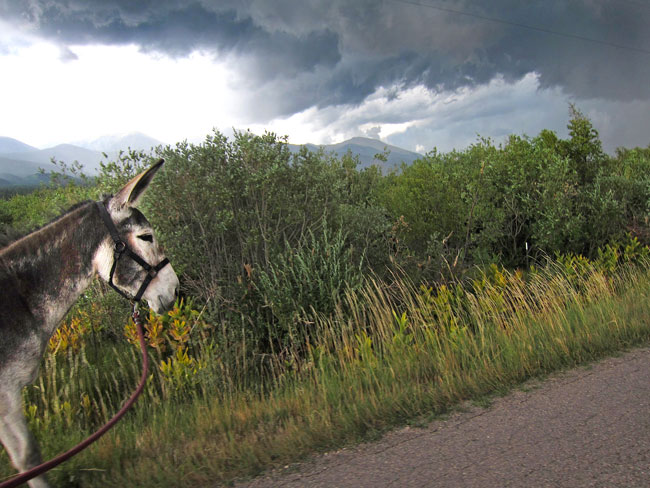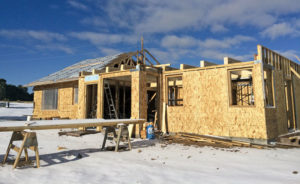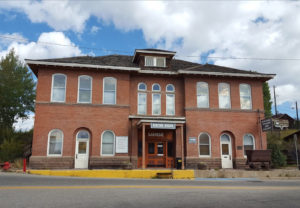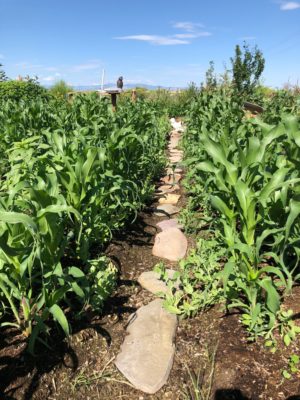By Hal Walter
After the driest spell in recent memory, the rains came pitter-pattering on the leaves of thirsty plants, splattering upon the dusty ground and at last creating a steady pouring sound as the water streamed from the roof splashing into the flower beds.
I’d just finished a long period of “work” which mostly involved wrangling words for money, but also writing various elegies for my mother-in-law Rosemary, who’d died July 10 at the age of 98. She’d lived a colorful and lengthy life, serving as a dietitian on a troopship in World War II, learning to pilot a single-engine plane, and perhaps most adventurously, raising six children, including Mary.
When I’d at last finished with this word-crafting, I realized that the rains had come and I really didn’t want to write anything anymore for a good long while, if ever. I felt a bit like Forrest Gump stopping in the middle of the desert and saying he was tired and ready to go home. Of course there is no news crew offering me a ride out of here.
I’ve watched this summer as the unprecedented heat has turned my mountain surroundings into a strange desert. Yucca and cactus which typically cling to the south-facing hillsides to stay warm and dry at this altitude have literally died. Some piñons and ponderosa pines randomly burst into tawny death, while others nearby flourish despite the fact there’s been no significant rain in months. Drought-hardy species like showy locoweed desiccated mid-bloom, while the orange paintbrush produced brilliant fluorescent flowers above leaves and stems bleached by the sun. The native grasses, the grama and fescue, stayed dormant leaving the summer landscape in its usual winter brown.
[InContentAdTwo]
With the arrival of the rains, outdoor activities suddenly switched from avoiding the searing heat to dodging thunderstorms. They were wreaking havoc all about, washing down a man-made cliff at nearby MacKenzie Junction and closing Highway 96 for two days, flooding down black water and debris off the burn areas of recent wildfires, and threatening small communities like Wetmore and Coaldale.
 Mother Nature bats last and is apparently swinging for the bleachers. This micro-drought we are experiencing here is not new and has really been in the works for two decades, punctuated by almost Biblical extremes in weather.
Mother Nature bats last and is apparently swinging for the bleachers. This micro-drought we are experiencing here is not new and has really been in the works for two decades, punctuated by almost Biblical extremes in weather.
What I have noticed over these past years of climate change is that while it’s generally grown warmer and drier, the weather events have shifted in intensity and become unpredictable. We have less snow in the winter and less rain in the summer; ponds and springs that historically held water have gradually gone completely dry. We got no snow the winter of 2002-2003, then it dumped six feet in about two days in March.
Rattlesnakes, previously a relative rarity at this altitude, have become common and I have unfortunately relocated three to their next lives this summer. Violent wind storms in these mountains have tossed about bug-killed spruce and fir like matchsticks, leaving the forest lifeless and virtually impenetrable in a chaos of crisscrossed dead timber. Wildfires, once infrequent, are now common and quickly become behemoths.
The thunderstorms, which traditionally brought the welcome summer moisture, have become in many cases deluges of epic proportions. For example when Highway 96 washed out this month, several neighbors nearby reportedly measured four to five inches of rainfall in less than an hour.
Recently, seeking a diversion from my usual workout around here, I drove across the Wet Mountain Valley to Willow Lane. As I often do, I brought along my burro Boogie and my son Harrison on his bike. I just wanted to run somewhere relatively flat and different. As we headed out from the truck I noted some cumulous clouds but felt confident we had a 45-minute window. I thought back to a similar circumstance a couple years ago when we got caught in a thunderstorm and Harrison melted down violently in an autistic tantrum, making a tense situation even more dangerous as the lightning popped around us and he refused to traverse the last half-mile back to the safety of the truck.
I could see an intense black thunderstorm brewing way to the north near Coaldale, and figured it would track east in the usual prevailing direction. We ran northward about 20 minutes, stopping to take a picture of Harrison at the old Willows Schoolhouse. As I was taking this photo against the backdrop of a black sky, the storm appeared to be headed south toward us. We continued a couple minutes and I realized that the cell was indeed headed toward us fast, though still a far distance away.
I decided to turn back right there. I told Harrison to ride as fast as he could back to the truck, get the key and get inside. He pedaled away but never got very far ahead. Oddly there was a headwind even though the storm cell was approaching from the other direction; plus it was slightly uphill back to the truck. I began eyeing the barns of ranches we passed for possible shelter, as I could feel the storm now over my shoulder.
Boogie was running at a fast trot. I think she knew there was a monster chasing us. We caught up to Harrison and I encouraged him to ride faster. He swerved his bike at me, shook his fists and made strange noises in protest. I told him it would be his own fault if he got caught in this and to put his energy into pedaling rather than acting out. We could now hear thunder closing in. He looked back at the black cloud and started pedaling faster.
We arrived back to the truck with just a few minutes to load up before the storm hit. It came in with fury I’d never before experienced in all my years of being outdoors in these mountains. It was like being caught in the undertow of Niagara Falls if half the waterfall was pea-sized hail. Of course there was lightning, too. To have been out in the force of all that falling water and ice would have meant certain serious injury or worse.
The roar on the roof of the truck was so thunderous that I had the strange urge to get out to escape the noise. Harrison put his hands over his ears. I could feel the trailer rocking the truck as Boogie spun around confused inside. I could not see to drive, and decided instead to go for the teachable moment during a lull in the racket, asking Harrison if he understood now when I say to ride fast this is why.
He looked away from the torrent outside and said that he did. We were safe and dry inside the truck, but it felt at once like only the present moment, where all things end and begin, there on the frontier of a world spinning wildly out of control.?
Hal Walter is the author of “Endurance and Selected Essays on Autism, Neurodiversity and Deep Sport,” available at the Book Haven in Salida and online at amazon.com.




